La Libreria Española: Beyond the Name and into the Microcosm
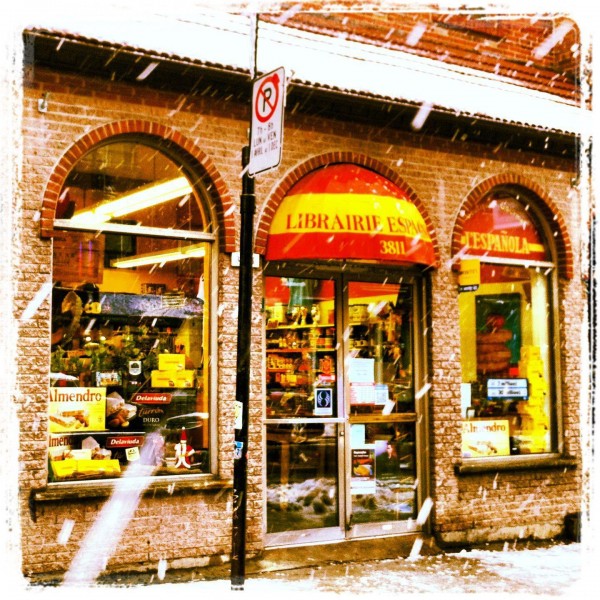
Librairie Espagnole in Montreal winter
The Librairie Espagnole on St. Lawrence boulevard: what a mysterious place! I have stumbled in there a few times over the years, usually eyeing the shelves suspiciously, wondering what they do here, but the whirlwind of food, books, pinatas, soccer jerseys, shoes, terracotta and cookware have started to settle in an arrangement that makes sense; or maybe I am just getting used to it?
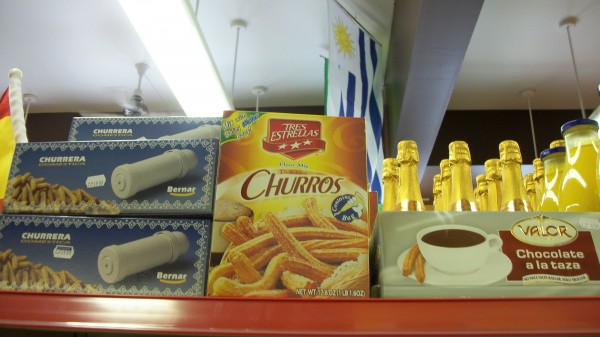
Mini churros maker for homes, churros dough mix and drinking chocolate- ahhh
I first saw Benmar at El Centro Gallego, the Galician Social Club on St. Lawrence boulevard. I was quietly informed that his father had La Libreria Española, but had died and now his mother and him ran it. The tone that was used was one of solemnity and reverence. I later approached Ben in November 2011 for the profiling of the businesses on St-Lawrence boulevard that I was doing for a gastronomic walking tour for Fitz & Follwell. I asked if I could have a few minutes to collect the history and some anecdotal tid-bits about La Librairie Espagnole. We spoke for an hour and a half, and this little world made more and more sense as he told the story. Finally, I spent June 20th, 2012 with the manager and soon-to-be owner Benmar Franco to see what a day of his looks like, and to get to the bottom of this place.
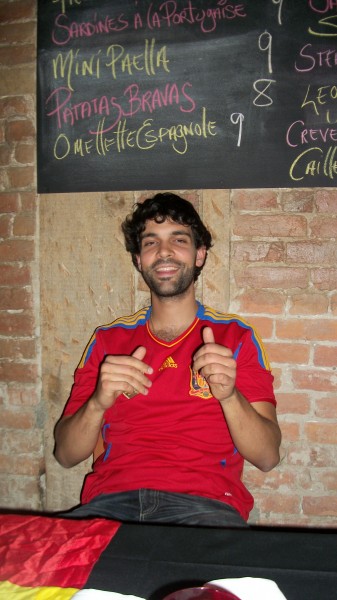
Ben off work- Spanish soccer fan to the end! (At la Movida)
He was very apologetic as he explained the arduous process of detangling 40 years of inherited organizational chaos. Piles of product catalogues and samples stacked-up over the years furnished his office. The tasks of buying a freezer, fixing a fridge, etc heaped the to the to-do list. How did the 27 year-old Benmar get to where he is, feeling like he has never caught up or “got it together” staring st the pile infinite pile of work on hand?
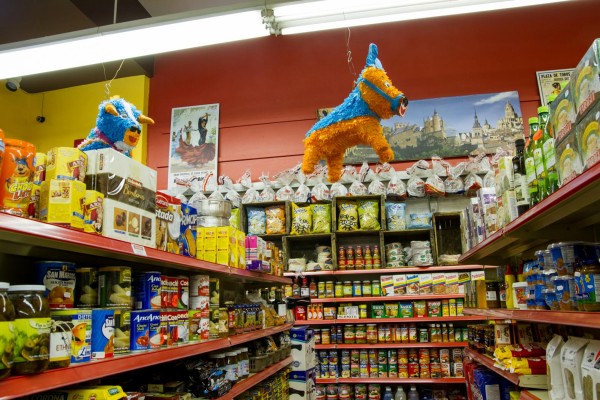
The Food and Pinata mascots (Photo by Mélanie Dusseault: http://melaniedusseault.com/fr/)
The majority of Spanish immigrants came to Montreal as part of Spanish immigration projects (eg. Oreracion Bisonte, Operacion Marta) in the late 50’s and 60’s to work on cattle farms, as domestics or in the textile industry, or of their own device and always to flee a brutal post-war Spain. The Plateau became their neighbourhood. La Librairie Espagnole was opened by Jose Manuel Sanchez in 1964 on the corner of Roy and St-Dominique. It was a Spanish media store with newspapers, books and magazines that kept Spanish immigrants up to speed with what was going on in Spain. Narciso Franco immigrated to Montreal in 1967. He bought the Librairie in 1974. Benjamin Franco, Narciso’s brother, immigrated from Spain in 1976 to come and help his brother with the shop. Benmar Franco Iglesias, Benjamin’s son, said jokingly that a helicopter picked him up and dropped him directly in the shop. Narciso also bought a Latin American grocery and media store on Rachel in 1976 called El Hogar Latin. In the 70’s, La Libreria started importing Spanish food. In 1978, conflicts with a landlord, a flood and the need for more space pushed Narciso to move La Librairie from the St-Dominique and Roy location and consolidate it with El Hogar Latin in its present home at 3811 St. Lawrence boulevard. La Libreria Española became the go-to for Spanish food products. They were also the only importer of Latin American food products in the 70’s.
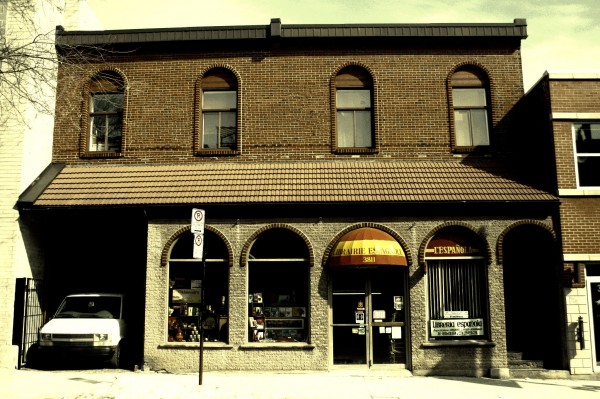
Back in the day
Ben’s mother, Maria Iglesias, of Spanish parents, grew-up in Montreal, but retained her Spanish Basque identity. Her father, Rodolfo Iglesias, was already importing coffee with Ben’s paternal Uncle Narcisso before his father Benjamin immigrated to Canada. His parents met in what is now the Salsathèque. Benmar was born in the 80’s and raised in Lasalle, but spent his weekends on the Plateau in the Spanish area. He grew-up with other second generation Spanish children, and the community was tight-knit through the 70’s and 80’s.
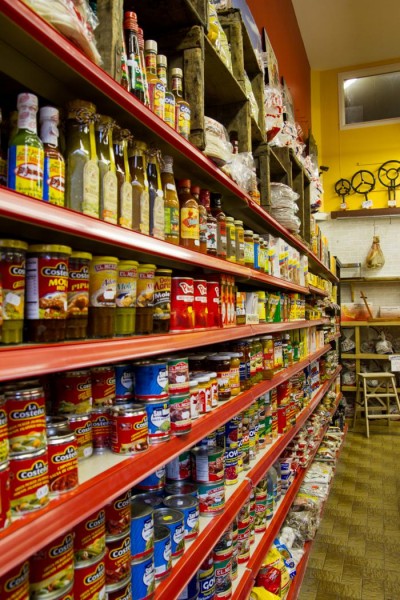
Delicious Colour! (Photo by Mélanie Dusseault)
In 2006, Benmar’s father died suddenly. Arrangements had not been made for the unforeseen death. Ben’s mom, Maria Iglesias who now owned Voyages Iglesias, became the owner, but did not have the time to run it. Ben had just finished Cégep at twenty-one and was on his way to study Publicity, but was nursing a dream of living in Spain. He left it all behind to take care of the family store.
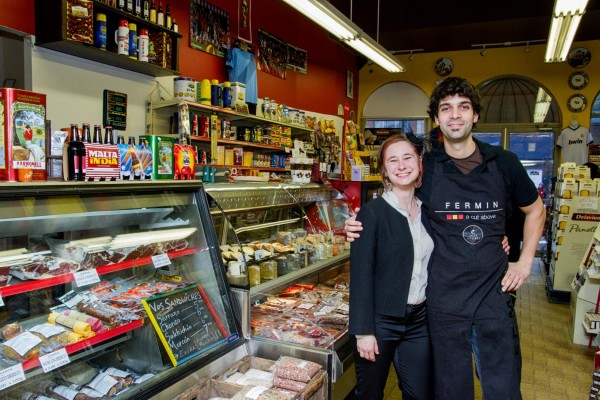
Ben Mar Iglesias Franco and yours truly- Come and join us on 'Round Table Tours' Iberian Montreal tour: circuit of tapas, pintxos and petiscos. (Photo by Mélanie Dusseault)
Ben is sheepish of the imperfections and the store’s lack of focus, but through the colourful cacophony of products, there is a real desire to accommodate and please. He is learning, however, to choose his battles, and that he can’t please everyone. The book/magazine section is now all the way in the back and very symbolic. They don’t make money on the printed word section anymore as it occupies one third of the space in the store and only account s for 7% of the sales. They still bring the minimum magazines and newspapers, like ¡Hola!, for example, (the Spanish version of Paris Match, that the older women come to buy religiously each week.) The shipping of such a small number of copies eats all of the profit, but there is also the possibility that those crossing the bridge and paying parking to get a magazine or newspaper, will buy some olives or a piece of chorizo. Then there is the double-edged sword of supplying soccer paraphernalia, as people want jerseys for their kid, a big flag, bracelets, a scarf and a little flag for the car, etc., and if the team is eliminated they are stuck with the stock. But the gear is all there. This willingness to please, teamed with the unpretentious products jumping off the shelves and hanging on hooks, also gives a warmth and integrity to the store and demonstrates their ability to adapt. The store has morphed with the needs of the time and customers now supplying La Bellota the Rolls Royce of Spanish ham at $400/kilo. The store also serves as a bridge between first and second generation Spanish and the new arrivals from Spain. Ben does his best to re-create the tight-knit sense of community that his parents benefitted from by providing familiar products to new Spanish arrivals and directing them to the circuit of Spanish social clubs and the network of Spaniards in Montreal.
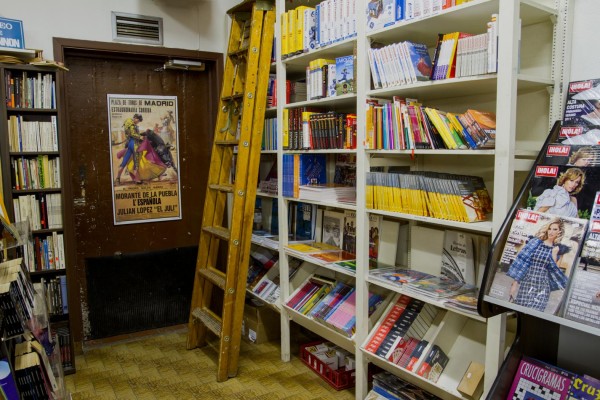
Still faithful to the original clients (Photo by Mélanie Dusseault)
The store is down to earth and genuine, but it is no small affair! They have warehouse space in the back and at another location. They import in a 40 foot container of turron (an almond candy) every year, three 20 foot containers of olives and fifteen twenty foot containers of yerba matte. The store’s sales have been stable throughout the recession: some clients buy less, but their clientele is always growing.
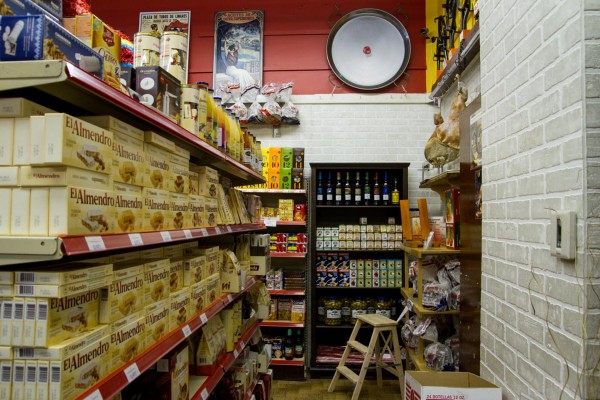
Turron en masse and the mega pallera on the wall (Photo by Mélanie Dusseault)
As the day progresses, I see the computer system Ben put in to replace the paper system, the assistant he is training to take over the office, invoices, and payments, the back-store he renovated and re-organized; the basement that he re-organized (that his Uncle deepened for three months with a pick!); the warehouse changes, the store’s changes, the elaboration of products, especially cheese and deli products, importation files and follow-up, calculating prices, all while greeting clients and receiving orders by fax, mail, e-mail, telephone and in person. He supplies, amongst others, La Vielle Europe, Exo Fruits, Grumann, Casa Tapas, Barraca and the terracotta for all of Montreal. They also ship to Vancouver, Toronto, Winnipeg, Ottawa, Calgary, Quebec City, Edmonton and Mississauga.
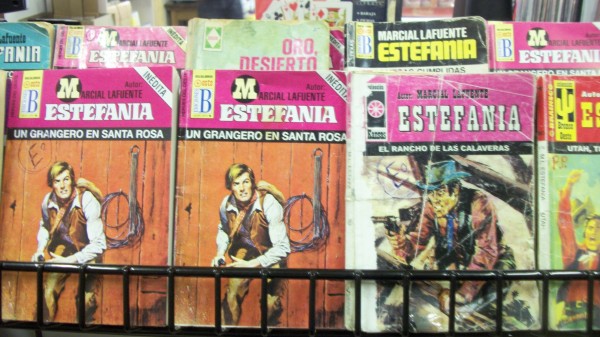
Spanish Western Novels: Old World Interprets New World
The store closes at 6:00pm. Ben says the most important lesson he has learned is “not to be afraid of making mistakes”. He claims he doesn’t have the natural inclinations of an entrepreneur: he isn’t aggressive enough, he’s too indecisive and doesn’t like taking risks. He is self-effacing, even though he has revolutionized the store, and he started the process at 21 years of age. He juggles satisfying stores, restaurants, and individual clients that want anything from chorizo, to shampoo, to shoes, to Spanish Western novels, and he puts a personal touch on all transactions. He is looking at buying property for another project, investing in another business and he still nurses a dream of having a little pinxto bar and Spanish food boutique.
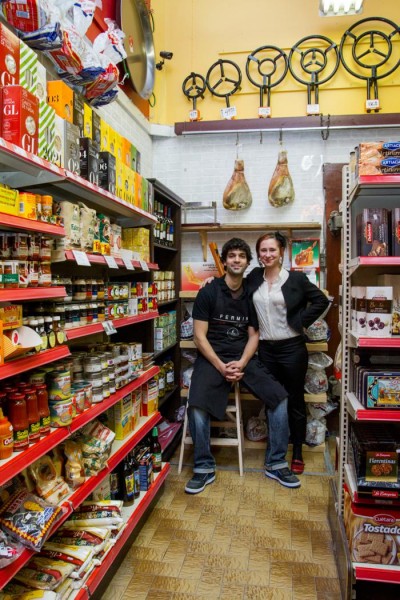
Venga Tapear con nos otros! (Photo by Mélanie Dusseault)
Please come tapear with me, go from place to place eating tapas, on the Iberian Montreal tour with ‘Round Table Tours : eating tapas, pintxos and petiscos paired with great wine around Montreal’s original Iberian Quarter at three restaurants, a specialized grocery store and a food production site. Meet the chefs and entrepreneurs and hear their stories.
*Please visit the website of Mélanie Dusseault at http://melaniedusseault.com/fr/
No related posts.
CATEGORIES
Archives
- February 2022 (1)
- October 2020 (2)
- September 2020 (1)
- January 2016 (1)
- January 2015 (1)
- October 2014 (1)
- February 2014 (1)
- January 2014 (1)
- July 2013 (1)
- June 2013 (2)
- May 2013 (1)
- March 2013 (1)
- February 2013 (2)
- November 2012 (1)
- September 2012 (1)
- June 2012 (2)
- May 2012 (1)
- April 2012 (1)
- March 2012 (1)
- February 2012 (1)
- January 2012 (2)
- December 2011 (1)
- November 2011 (4)
- October 2011 (4)
Popular Tags
'Round Table Tours Asian breakfast business prolfiles cabbage canning Community Europe Events farms fermentation Fitz & Follwell Food & Story Food history Food Production food tours fresh juices Friends gastronomy health herbs History Italy kimchi Meal exchange Nuart organic preserves public Quebec restaurant Rumble & Shakes Réseau d`Entraide de Verdun salt smoothies spicy Tours de la Table Vegan youtube videos


